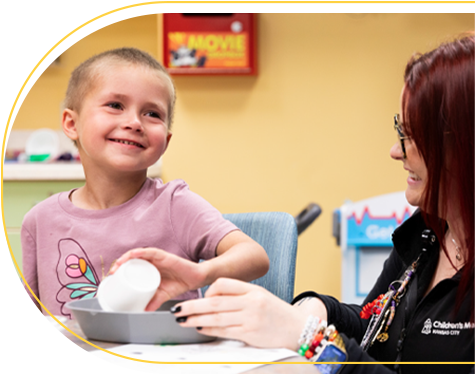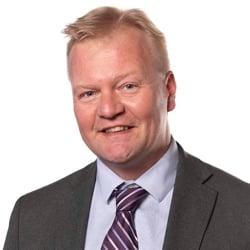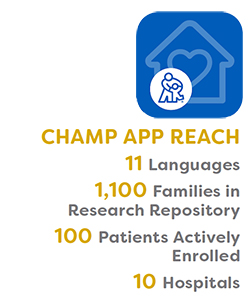Research Impact
You are helping patients fight cancer through genetic testing
Above and beyond in pediatric oncology

When a normally sassy and energetic 5-year-old daughter becomes withdrawn and miserable, something is not right. In February of 2023, parents Chris and Kayla took their daughter, Parker, to their local emergency room in Salina, Kansas, where the care team discovered a large mass in her belly. The care team sent the family straight to Children’s Mercy Kansas City.
Parker was diagnosed with rhabdomyosarcoma, a cancer of the soft tissues of the body. The first step of her treatment was surgery to remove the mass in her abdomen, followed by radiation, which successfully sent Parker’s cancer into remission.
The Children’s Mercy Cancer Center cares for nearly 2,000 children and families each year from across the region. As a U.S. News and World Report top-rated hospital, Children’s Mercy is focused on research that produces real results—like survival rates that beat the national average—for children with cancer.
Genetic testing gives insight for treatment
Shortly after Parker’s surgery, her care team approached Chris and Kayla to see if they would be willing to do genetic testing on all three of them. They agreed without hesitation. “If it could help another little kid, why not?” Kayla shared.
Sequencing both tumor and healthy tissues accelerates the ability to identify variants for future treatment. Investigators at the Children’s Mercy Research Institute (CMRI) have developed a genetic test for all children newly diagnosed with cancer or those who experience a relapse of their disease. The test allows researchers and physicians to better understand treatment options for a child’s cancer, their chance of survival, and hereditary cancer risk factors for the patient and their family.
The whole-exome-sequencing-based test was developed by Midhat Farooqi, MD, PhD, and Lisa Lansdon, PhD, both working in cancer genomics in the CMRI Department of Pathology and Laboratory Medicine. Exome sequencing allows researchers to and a molecular diagnosis in families with children who have a genetic basis for their disease.
If we know that a tumor has a specific genetic alteration, we can target it with precision therapy or a drug that works only for tumors with that specific genetic mutation.
Dr. Farooqi has high hopes for the impact genetic testing can have on the future of cancer treatment for kids like Parker.
Their family’s testing was especially timely because Kayla was pregnant with Payton, Parker’s little sister, when Parker was diagnosed. “We tested Payton within a couple weeks of birth to stay on top of it,” Kayla shared.
“We thought, why wouldn’t we try to catch this early on, because it could help us avoid Payton having to go through what Parker’s going through all over again?”
Baby Payton’s test was negative for the mutation and now the family is armed with information that helps them proactively care for their health. They will all get regular screenings, and Parker will be monitored very closely for any changes in her health. Careful cancer surveillance can help Parker’s family catch any possible tumor growth early—and respond quickly.
Your generosity fuels research
Your contribution to research fuels world-class work that impacts children, families and care providers in the Kansas City region and around the world. The Children’s Mercy Research Institute brings together nationally recognized expertise in genomic medicine, precision therapeutics, population health, emerging infections and health care innovation.
Genomic Answers 4 Kids
One of the initial flagship research projects of the CMRI is Genomic Answers for Kids (GA4K) a first-of-its-kind pediatric data repository. GA4K has quickly become the best system for rare disease diagnosis in the world.
Since GA4K launched in 2019, researchers have enrolled 12,757 individuals from 5,441 families. This data has led to more than 1,600 rare disease diagnoses.
Optical genome sequencing
Children’s Mercy is the first pediatric hospital in the U.S. to clinically launch Optical Genome Mapping (OGM), an advanced digitized technology that enhances the detection of genetic abnormalities.
“This cutting-edge technology has proven instrumental in diagnosing genetic disorders and cancers by identifying structural variants that standard tests may overlook,” said Carol Saunders, PhD, FACMG, Division Director, Clinical Genetics and Genomics, Children’s Mercy.

5-base sequencing
Researchers at the CMRI are pioneering one of the newest technologies in genomic medicine called 5-base sequencing. Children’s Mercy is the first pediatric hospital in the country to launce 5-base sequencing in the hospital.

A decade of innovation in remote health
Children’s Mercy has pioneered remote health solutions. This innovative program allows patient health to be monitored through technology and dedicated care teams so patients and families can spend more time at home.
Before CHAMP®, patients might have stayed at the hospital between their first surgery (within a week of birth) and second surgery (between four and six months later). Now, patients get to spend that time at home.
“CHAMP® builds that bridge of transition home from the hospital, so our families can stay at home and have support from their specialists,” said Dr. Lori Erickson, stressing that it’s the care team, not the technology, who are the real stars of CHAMP®.
*Statistics as of fiscal year 2024.
